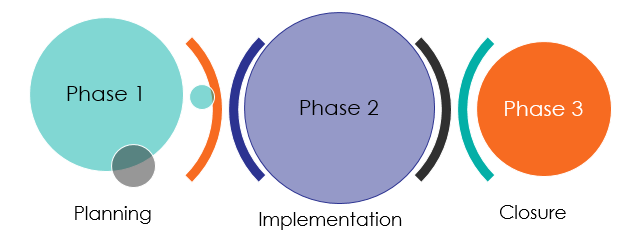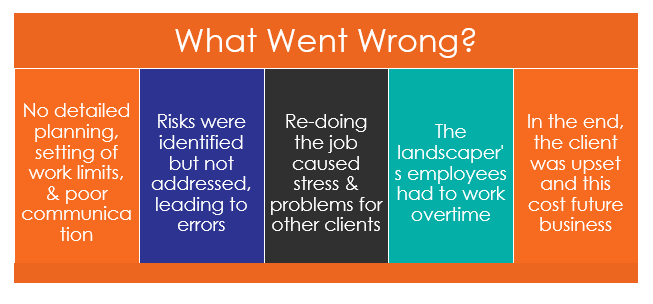Welcome to
Project Management broken downStarting your project out right
Module One
How Project Management Works
Project management is a well-established and practiced methodology for medium and large businesses. But even for large companies, many projects are small or medium in scale; in other words, the exact kinds of projects that you as a small business owner will also be carrying out. These projects can range in scale from organizing an event to designing a logo and theme for a client’s website.
First, let’s define exactly what a “project” is, since the term is so wide-ranging. A project is something that:
- Is temporary. In other words, it has a definite beginning and end.
- Is unique. It has a specific set of operations designed to achieve a particular goal.
- Has boundaries – in terms of cost, time, performance, resources and scope.
- Satisfies customer objectives and goals, whether directly or indirectly.
Once a project is identified, there are three key phases in its life cycle:

- Planning
- Implementation
- Closure
What this means is that a project is something your organization does beyond its routine, ongoing tasks and activities. Stop here for a moment to consider business operations you’ve carried out in the last few days that fit into this category.
An important challenge for small businesses is to identify correctly what is a “project” and what is “work.” If you miss a project and identify it as work, and thus fail to give it the proper planning it needs, the results can be disastrous. You’ll end up with a project that is not executed well. It will lack the upfront planning, tracking, and follow-up that it needs.
Furthermore, when you fail to recognize a project for what it is and instead see it as a collection of related tasks, you’ll most likely end up incurring higher costs, missing deadlines, and frustrating all of those involved, including team members, customers, and stakeholders.
One major area that suffers when a project is not carefully planned is communication. When small projects are not managed, key communications such as status updates can easily be missed. This can lead to all kinds of problems, such as confusion over deliverables and deadlines. In a worst-case scenario, this lack of communication can alienate stakeholders and cause them to become disengaged, with the possibility that they may terminate a project.
When Project Planning Goes Wrong – An Example
To illustrate what can go wrong when a small business doesn’t plan well, let’s look at a landscaping company. A customer calls and requests a landscaping job. The landscaper goes to the client’s home and completes an initial consultation. The client agrees to the work and the job begins.
Upon starting the job, the landscaper discovers some issues that were not discussed with the client. Rather than contacting the client to ask about these issues, the landscaper goes ahead and does the best they can, making various changes along the way since they have other jobs coming down the line.
When the work is completed, the client is furious because the landscaper didn’t honor their wishes. As a result, the client refuses to pay. The landscaper must redo the landscaping the next weekend free of charge, and this pushes back the other work that has come since this job began.
What went wrong in this example?

- There was no detailed planning, no setting of work limits, and insufficient communication.
- Risks were identified but not addressed, leading to errors that cost a great deal of money.
- Re-doing the job was stressful and a waste of time, and caused problems for other clients who were waiting for their work to be done.
- The landscaper’s employees had to work overtime, costing the company directly.
- In the end, the client was upset and this cost future business from the client and potential referrals.
You can clearly see that a little project planning goes a long way. All of this could have been avoided if the small landscaper had treated everything as a project and not just work.
In this course, you’ll learn proven project management processes and strategies specific to small and medium sized businesses. You will then apply what you’ve learned to one of your own projects
Activity:
- From the work tasks that you do, list some examples of work vs. projects. Remember that projects are temporary, unique, and satisfy customer objectives. Are there some examples from your business that you should have treated as a project?
- How do you manage your projects today? Do you have a formal process or tools that you use?
A Word
From Tamara
As an entrepreneur myself I completely understand the stress, anxiety and frustration around launching or growing a business. I also know the rewards and life style change the hard work can provide you if you stay focused. I am here to inspire and motivate you to push forward. The fact that you’re investing in your business education let’s me know you’re in this to win. Rest assured I’m here to help you…. These courses are set up to help you understand the basics. To dig deeper into your specific plan of action we will discuss where you are, where you want to be, eliminate any blocks preventing you from getting to the next step and create an action plan.

Our superpower is making you a superhero.

